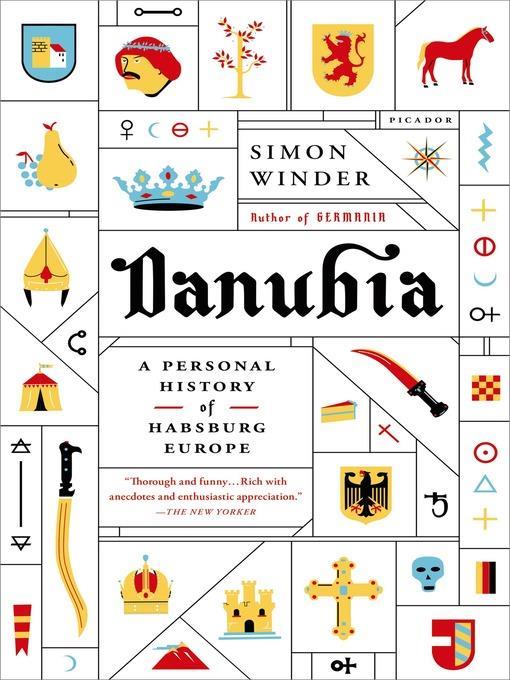
Danubia--A Personal History of Habsburg Europe
کتاب های مرتبط
- اطلاعات
- نقد و بررسی
- دیدگاه کاربران
نقد و بررسی

October 28, 2013
The Habsburgs, Europe’s most durable, powerful dynastic family, held sway from the late Middle Ages till the end of WWI, ruling lands that now comprise 19 modern countries. Penguin UK editor Winder offers a meandering combination of history, travelogue, and personal digressions to follow his previous work Germania. He begins with flighty, indecisive, mid–15th-century dynasty founder Frederick III and moves mostly chronologically down the line. Maximilian I, Dürer’s patron and an intellectual man of action, stretched Habsburg holdings “from the Danube to the North Sea.” Grandson of Maximilian as well as Ferdinand and Isabella of Spain, the canny yet overburdened Charles V opposed the Protestant Reformation, successfully aided in the Italian Wars against France, and nearly ruled all of Europe in the 16th century. Maria Theresa, the sole female sovereign, kept the Habsburg lands intact in the 18th century, had 16 children, and successfully ruled for 40 years. Her son Joseph II liberated the serfs and the Jews, carved up Poland with Russia, and helped repel the Ottomans. In the face of Napoleon, “feeble” Franz II’s self-elevation as hereditary Emperor of Austria gave the family another 114 years of power. Overall, Winder’s longwinded and self-indulgent rhapsody is knowledgeable and perceptive, but he lets his wit overwhelm the narrative. Illus.

December 1, 2013
Offbeat portrait of the lost past of Central Europe, ruled by the dull but dependable Habsburg dynasty. That history stretches out for nearly half a millennium, and Penguin Press U.K. editor Winder (Germania, 2010, etc.) pokes into nearly every corner to examine both the stability of what would become the Austro-Hungarian Empire and its inevitable decline in the aftermath of World War I. With characteristic lightheartedness, the author ascribes the dynasty's longevity to "the ability of the senior male to produce heirs and avoid going mad," but it did not hurt that the Habsburgs introduced a perfectly functioning if soulless bureaucratic machine of the sort that Habsburg subject Franz Kafka would lend his name to. Winder ranges broadly in space as well as time. As he notes, half of the time it took to research and write his book was spent simply wandering the streets of provincial and national capitals as well as small villages, turning up treasures such as the great imperial cathedral at Speyer, where Rudolf of Habsburg lies buried: "For anyone growing up in England or France and used to Gothic it is very alarming to be surrounded by Romanesque gigantism, particularly when made expressionist by malevolent pools of darkness and weird echoes from shuffling feet." Winder's offhand, jokey mannerisms could be precious in lesser hands, but he pulls it off, and his book has plenty of serious turns, as when he ponders the curious rise of nationalism in a country that embraced several quite different nations, from Transylvania to Slovakia to a large stretch of the German-speaking world. That nationalism, of course, eventually produced Adolf Hitler, who may have been inevitable. "Was it inherent in the destruction of the Habsburg Empire," Winder wonders in closing, "that Nazism would result?" It's a meaningful question, one of many that Winder raises in this lucid, often entertaining historical travelogue.
COPYRIGHT(2013) Kirkus Reviews, ALL RIGHTS RESERVED.

September 15, 2013
The Habsburg Empire was a ramshackle, lumbering old giant centered in the Danube Valley that held a central place in European politics from the Middle Ages to the end of WWI, ruled by the dominant dynasty of Europe for four centuries, the Habsburg family. Winder set out to wander through the lands that used to constitute the empire, describing and reflecting on what he sees now, particularly in terms of the appearance of villages, towns, and cities, and what he knows through his research as to how things used to look when the Habsburgs held sway. The sentiment around which he builds his colorful narrative is that the longevity of the Habsburg dynasty was due to a mix of cunning, dimness, luck and brilliance. (About one particular archduke, Winder says, he was one of the Habsburgs who make the family worthwhile, who make up for all the pious timeservers who congest the family tree.) This personalized, almost you-are-there view of history results in an arresting combination of anecdote and scholarly examination, where the interests of serious armchair travelers and devoted students of European history meet.(Reprinted with permission of Booklist, copyright 2013, American Library Association.)

























دیدگاه کاربران